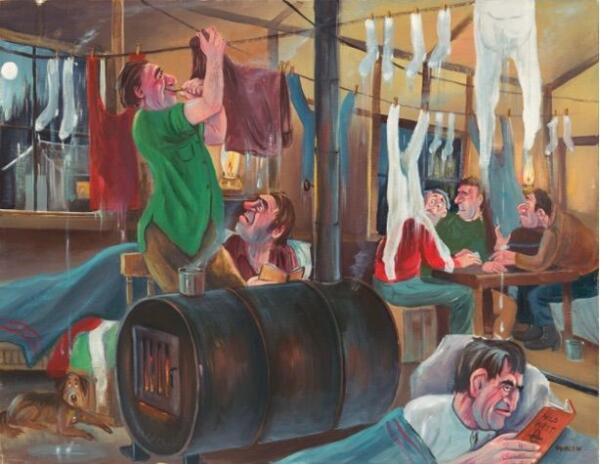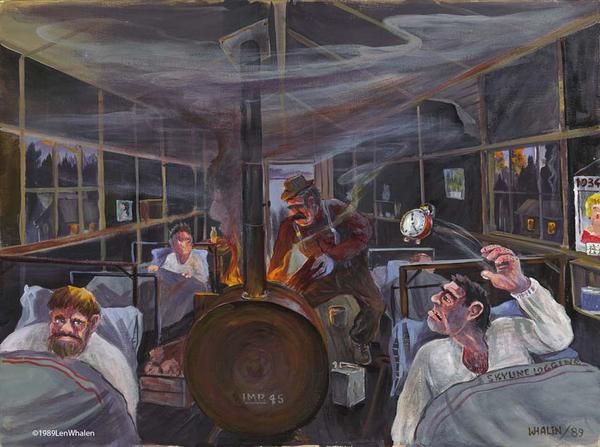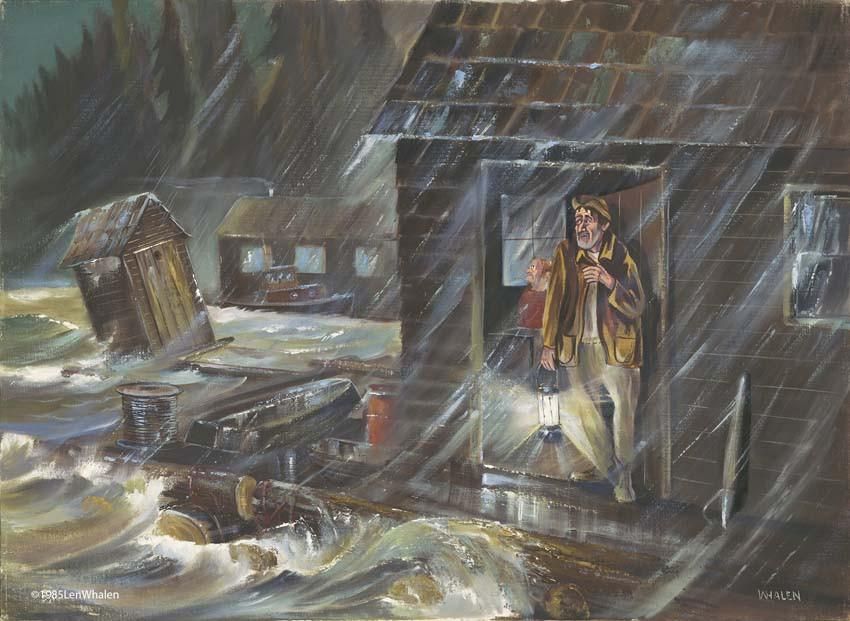1961 Logging camp life
The Rangitangs: Life on the Edge – A Humorous Look at Coastal Loggers Float-camp Life from the 1920s to 1950s
by Mike Whalen
Self-published by Mike Whalen, 2023
$40.00 (soft cover) / 978173885723
Reviewed by Matthew Downey
*
 Inspired by the cartoon collection from which it draws its name, The Rangitangs: Life on the Edge is a tribute to the experience of the men and women drawn to British Columbia by the coastal logging industry in the early and mid decades of the twentieth century.
Inspired by the cartoon collection from which it draws its name, The Rangitangs: Life on the Edge is a tribute to the experience of the men and women drawn to British Columbia by the coastal logging industry in the early and mid decades of the twentieth century.
Len Whalen, the artist behind the cartoons, had a key role in one of the several logging companies that undertook the task of harvesting the forests of the western edge of Canada during the 1920s and 1930s. Whalen’s Rangitang Collection, produced in the 1970s, was an artist’s memoir of that unique world. In this book, his son Mike Whalen perpetuates his father’s work.

Taking the form of a collection of essays and cartoons, The Rangitangs is both personal and impersonal in character, combining colourful stories of various individuals in the coastal logging industry with dry but useful histories of the companies and era in which they worked and lived. The range of tone and perspective reflects a comprehensive passion to preserve the personal history of its subject.
One of the goals of The Rangitangs is to extract the sense of mystery and romance inspired by the dramatic landscape of the working coast and presenting it with a jovial yet realistic portrayal of the hardworking life of those who made a living out of the bush. In pursuing that goal this book taps into a uniquely British Columbian spirit — at least an historical one as portrayed for example by Martin Grainger’s Woodsmen of the West (London: 1908) – that imagines the deep, dark, and ancient rainforest as, first and foremost, work to be done.

At its core, The Rangitangs, like the titular cartoon series, illustrates the job of coastal logging and the men who undertook it. For such people, the BC coast was equal parts monster and opportunity. In striking a balance between these, it makes sense that the humour of The Rangitangs should be found less in absurdity or exaggeration than in honest representation of the domestic and work settings and how the forest industry workers coped with their shared livelihoods.
Len Whalen’s essays provide context and background that help the reader understand his mindset, and provide insight into the cartoons as something more akin to an historical account than just calendar art.
Ultimately, Rangitangs fills a specific niche as a preservation of the personality of early and mid-twentieth century logging, highlighting an intimate and funny side of the camp life in the coastal logging industry that is not often shown in provincial histories.
Whalen’s essays and stories provide needed context for his folksy and celebrated cartoons, and Rangitangs provides historical depth while never sacrificing its relaxed and personal tone. In so doing, Mike Whalen perpetuates his father’s cartoons and paintings for those who share a connection or interest in the bygone era of frontier coastal logging on the Canadian west coast.

*

Matthew Vernon Downey graduated in 2021 with an honours BA in History and Political Science from the University of Victoria, and in 2022 gained an MSc in international history at the London School of Economics and Political Science. After a year in Southwark, England, he is back in Victoria. [Editor’s note: Matthew Downey has also recently reviewed books by D.C. Reid, Alexander Globe, Angus Scully, David Giblin, Bill Arnott, Catherine Marie Gilbert for The British Columbia Review.]
*
The British Columbia Review
Interim Editors, 2023-24: Trevor Marc Hughes (non-fiction), Brett Josef Grubisic (fiction)
Publisher: Richard Mackie
Formerly The Ormsby Review, The British Columbia Review is an on-line book review and journal service for BC writers and readers. The Advisory Board now consists of Jean Barman, Wade Davis, Robin Fisher, Barry Gough, Hugh Johnston, Kathy Mezei, Patricia Roy, Maria Tippett, and Graeme Wynn. Provincial Government Patron (since September 2018): Creative BC. Honorary Patron: Yosef Wosk. Scholarly Patron: SFU Graduate Liberal Studies. The British Columbia Review was founded in 2016 by Richard Mackie and Alan Twigg.
“Only connect.” – E.M. Forster
5 comments on “1961 Logging camp life”
Thank you, very interesting and intriguing.